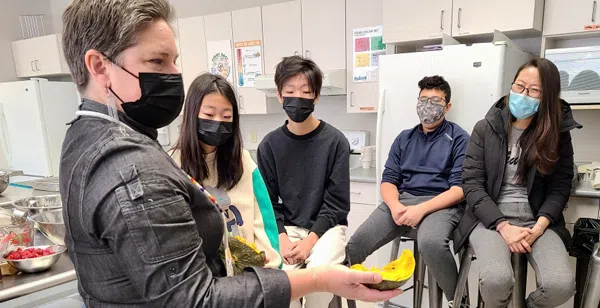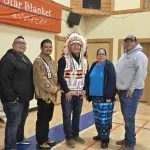
Regina Open Door Society focuses on indigenous education
The Regina Open Door Society (RODS) is taking the idea of breaking bread quite literally with some of its new Indigenous education programs.
Haiming Li, RODS youth program coordinator says catering to newcomer youth is important and, thanks to funding from SaskCulture for Indigenous education programs, they were able to create some fun activities.
Having previously dabbled into other parts of Indigenous identity such as art, culture and history, Li said they were looking at doing something different.
“We had not done anything in regards to food, so we started a search for an Indigenous chef,” she said. “We reached out to chef and culinary consultant Jenni Lessard and she replied to us. We then began to discuss the cooking workshop in October.”
Lessard, who is Metis, runs a company called Inspired By Nature Culinary Consulting, located in Lumsden. Prior to opening her business, she operated her own restaurant in Birch Hills for eight years and was also once the executive chef at Wanuskewin Heritage Park.
Lessard said growing up in northern Saskatchewan inspired her to pursue cooking as a career.
“We didn’t have television, cell phones or internet, so I would cook for something to do and loved to pick berries and learn about the different plants and their uses,” she said.
Although most of their workshops are online, Lessard recommended the cooking workshop would be more impactful if it took place in person. Planners had to find a kitchen to contain all the attendees, which they didn’t have. Fortunately, the Regina Food Bank stepped up and let them use its training kitchen.
Lessard said meeting in person was important because food holds a very deep and significant meaning to her.
“More than being a chef, I’ve always known I wanted to feed people,” she said. “I got that guidance from my maternal grandmother because her house was a gathering place for not just our family, but for other people in the community who needed something to eat.”
Her grandmother didn’t cook fancy food, instead, she made simple delicious food, which is also Lessard’s approach to cooking.
She said being able to share Indigenous meals is special, because not too long ago, it was not the norm.

Photo supplied
“For a while many Indigenous people were hiding who they were and what their roots were because it wasn’t safe to be an Indigenous person in Canada,” said Lessard. “There were things I wished I could have asked my grandma and my aunt. I would have loved to have known what the origins of the things we ate are. It is important to pass down cultural traditions around food.”
The RODS youth learned to make rose-hip butter and vegetarian soup with wild rice from northern Saskatchewan and squash. Lessard shared important historical facts about Indigenous foods.
“We think of Canada as synonymous with maple syrup but that’s an Indigenous meal,” she said. “I also showed them some teas that are harvested from northern Saskatchewan.”
Lessard says she only teaches things she’s been taught or has learned on her own because not all Indigenous cuisine is the same.
“I don’t think I’d be able to cook Indigenous cuisines from the East/West coast without learning from someone who has lived on that land and who can show me what to do.”
The event was a success, which Lessard attributes to it being food-based.
“I don’t think it’s possible for you to eat with someone and not feel connected after.”
Li said organizing events like this for newcomers can be a challenge.
“Because most immigrants do not know the importance of Indigenous history, it’s a little hard for us to promote the program,” she said. “We let them know that it’s important to learn something about the Indigenous people in Canada.
RODS continues to offer Indigenous education programs, including other food-based workshops, powwow information sessions and truth and reconciliation education.

